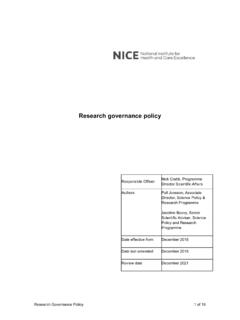Transcription of Laws Applicable to Medical Practice and Hospitals in India
1 Laws Applicable to Medical Practice and Hospitals in IndiaInternational Journal of Research Foundation of Hospital & Healthcare Administration, July-December 2013;1(1):19-2419 JRFHHALaws Applicable to Medical Practice and Hospitals in India1 Madhav Madhusudan Singh, 2 Uma Shankar Garg, 3 Pankaj AroraABSTRACT Healthcare in India features a universal healthcare care system run by the constituent states and territories. Law is an obligation on the part of society imposed by the competent authority, and noncompliance may lead to punishment in the form of monetary fine or imprisonment or both. The earliest known code of laws called the code of Hammurabi governed the various aspects of health practices including the fees payable to physician for satisfactory services. The first ever code of Medical ethics called the Hippocratic oath was laid down 2500 years ago, in the 5th century BC, by Hippocrates the Greek physician.
2 The modern version of Hippocratic Oath (called the declaration of Geneva), devised by the WHO after the second world war and is accepted by international Medical fraternity. The process of establishment of healthcare system during the colonial rule also necessitated creation of legislative framework for practitioners of medicine. As the number of doctors qualified in Indian Medical colleges increased, creation of laws for them became necessary. The Medical council of India , a national level statutory body for the doctors of modern medicine, was constituted after the enactment of Indian Medical Council Act 1933. The first legal recognition and registration for the Indian systems of medicine came when the Bombay Medical Practitioner Act was passed in 1938. Laws governing the commissioning of hospital are the laws to ensure that the hospital facilities are created after due process of registration, the facilities created are safe for the public using them, have at least the minimum essential infrastructure for the type and volume of workload anticipated and are subject to periodic inspections to ensure compliance.
3 There are other laws pertaining to governing to the qualification/ Practice and conduct of professionals, sale, storage of drugs and safe medication, management of patients, environmental safety, employment and management of manpower, medicolegal aspects and laws pertaining to safety of patients, public and staff within the hospital premises. There are laws governing professional training and research, business aspects, licences/certifications required for Hospitals , etc. A hospital administrator should be aware about all these laws, regulations, policies, procedures, reports and returns and keep abreast with the latest amendments to be on the safe side of law and provide quality care to the patients. Keywords: Healthcare, Law, Act, Code, Health practices, Medical ethics, Hippocratic, Declaration of Geneva, Medical council of India , Statutory body, Indian systems of medicine, Commissioning of hospital, Conduct of professionals, Environmental safety, Employment and management of manpower, Medicolegal aspects, Patient safety, Professional training, to cite this article: Singh MM, Garg US, Arora P.
4 Laws Applicable to Medical Practice and Hospitals in India . Int J Res Foundation Hosp Healthc Adm 2013;1(1) of support: NilConflict of interest: NoneINTRODUCTION Human culture is built upon the formulation of values that form the basis of an ethical society, honesty, integrity, respect, pursuit of excellence, civic duty, accountability and loyalty. Since the dawn of civilization, by trial or error, it has become established that a society and more so it s Medical profession, a public oriented and noble profession, can survive and thrive only by observance and Practice of certain rules of conduct guided by ethical, moral, legal and social values of land. Healthcare in Indian features a universal healthcare care system run by the constituent states and territories. The constitution charges every state with raising the level of nutrition and the standard of living of its people and improvement of public health as among its primary duties.
5 Law is an obligation on the part of society imposed by the competent authority, and noncompliance may lead to punishment in the form of monetary fine or imprisonment or both. In a survey conducted at Mumbai, eight out of 10 doctors feel that the laws that govern the Practice of healthcare in India are outdated and even higher majority feels that there are too many laws and licences that are required to keep their Practice going. A survey among 297 doctors across specializations says that there are about 50 different laws that govern the Practice of healthcare in India . The study conducted by Medscape India , a nonprofit trust of doctors, revealed that 78% of doctors feel that many of the laws that govern Medical Practice are outdated. Licences have to be procured by doctors running a hospital every LAWS IN India The earliest civilization known to us is the Indus urban culture of 3000 to 2000 BC.
6 The renowned Medical historian Henry Sigerist 2 believed that public health facilities of Mohenjo Daro were superior to those of any other community of the ancient orient. Since the ancient times, certain duties and responsibilities have been cast on persons who adopt this 1,2 Medical Officer (Hospital Services), 3 Assistant Professor1 Ministry of Defence, L Block, New Delhi, India 2 Military Hospital, Panaji, Goa, India3 Department of Hospital Administration, Postgraduate Institute of Medical Education and Research, Chandigarh, IndiaCorresponding Author: Madhav Madhusudan Singh, 543 AFNO Enclave, Plot 11, Sector 7, Dwarka, New Delhi-110075 India , e-mail: AND ETHICAL Madhusudan Singh et al20sacred profession. This is exemplified by Charak s Oath (1000 BC) and Hippocratic Oath (460 BC). The written evidence of the state s involvement and regulatory function is available from the Kautilya s Arthashastra.
7 Kautilya considered famine as a bigger calamity than pestilence and epidemics, as the remedies can be found for the diseases. He believed that the king should order the physician to use medicine to counter The earliest known code of laws of health practices were the laws formulated around 2000 BC by Hammurabi, the great king of Babylon. These laws, also called the code of Hammurabi governed the various aspects of health practices, including the fees payable to physician for satisfactory services. The laws were drastic and penalties for harmful therapy stringent. Doctors whose proposed therapy proved wrong ran the risk of being killed. This was the first codification of Medical first ever code of Medical ethics called the Hippocratic oath was laid down 2500 years ago, in the 5th century BC, by Hippocrates the Greek physician.
8 He is remembered till today as the Father of western medicine . Hippocratic oath has been guiding and regulating the conduct of doctors for centuries. The modern version of Hippocratic Oath (called the declaration of Geneva), devised by the WHO after the second world war and accepted by international Medical fraternity as the international code of Medical ethics, draws heavily upon the ancient oath. During the Ashoka period (270 BC), the state showed interest in the public works and provision of Medical care and as a law. He founded Hospitals all over his empire with Medical attendance at state Ethics is described in the Charaka Samhita, in details and Ayurvedic physicians of ancient India has a well-defined Medical ethics .5 The colonial power brought with them their own physicians and barber surgeons. In the mid 19th century, as the medicine got recognized in England, it slowly started having its impact in India too.
9 After 1857, the main factors that shaped colonial health policy in India were their concern for troops and European civil process of establishment of healthcare system also necessitated creation of legislative framework for practitioners of medicine. In the earlier period of rule, the physicians and surgeons brought by the East India company and after 1857 by the British Government, needed some discipline and regulations. Lt Colonel DG. Crawfords A history of Indian Medical services, 1600-1913 narrates several instances of in-discipline, insubordination, malpractice, etc. by such doctors and the punishments (including deportation) mated out to them. It also narrates the regulation devised by the East India Company for the Hospitals established by them. After the enactment of the law, establishing General Medical Council in 1857 in England, the British doctors employed in India were registered with the GMC and came under its disciplinary regulation.
10 As the number of doctors qualified in Indian Medical colleges increased, creation of laws for them became a part of criminal procedures and for other purposes, the colonial government had, in 1871, enacted Coroner s act Applicable to Bombay and Calcutta. It defined the role of Medical professionals in the work of conducting autopsy and inquests. However, the laws for the creation of indigenous Medical councils took many more years for enactment. Mean-while, the laws were enacted for the the prevention of the spread of dangerous epidemic disease, for the segregation and Medical treatment of pauper, etc. The epidemic disease act was first enacted in 1807 and is still in force with amendments, while the Lepers Act 1898 was repealed and substituted by another law in early Medical College Society in 1880 passed a Bombay Medical Act and established the Medical council.





